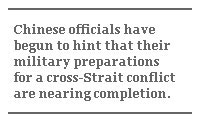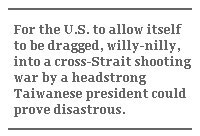Washington Hopes for the Best; Beijing Prepares for the Worst
Washington Hopes for the Best; Beijing Prepares for the Worst

LOS ANGELES: The driving downpour that accompanied Taiwan President Chen Shui-bian's second inaugural address on May 20 accurately reflected the stormy state of relations between Beijing and Taipei. Although the generally conciliatory tone of Chen's remarks was intended to allay fears of an impending cross-Strait collision, Chen's pointed insistence that Taiwan was "a member of international society", and Beijing's subsequent denunciation of Chen as "a complete troublemaker", were sobering reminders that underlying tensions remain unabated in the Taiwan Strait. Reports of stepped-up Chinese military preparations suggest that there may now be less diplomatic slack than before.
Nobody foresees a conflict tomorrow. For one thing, China is trying hard to cultivate a peaceful, cooperative international image in the run-up to the 2008 Beijing Olympics. For another, a war in the Taiwan Strait would most likely draw in the United States on Taiwan's side.

In his inaugural address, Chen Shui-bian sought to calm fears of an imminent clash by soft-pedaling his pro-independence agenda. Citing the absence of a clear popular consensus on the question of Taiwan's national identity, Chen promised not to change Taiwan's name, flag, or legal status during his tenure in office. On the question of cross-Strait relations too, Chen's speech was generally moderate and restrained. Conceding that the Taiwanese people could "understand why the government on the other side of the Strait, in light of historical complexities and ethnic sentiments, cannot relinquish its insistence on the 'one China principle'", he spelled out his hope for a peaceful future. If the two sides can make "a concerted effort to find some positive aspect of our differences and commonalities," he said, "perhaps we shall discover a wonderful opportunity, a catalyst for building a cooperative and mutually beneficial relationship." But he accompanied this with a sharp reminder to Beijing that "Taiwan's existence as a member of international society is also a fact. Such realities cannot be negated by anyone for any reason."
China's initial reaction to such bravado was predictably frosty. Dismissing Chen's ostensible display of goodwill as "another sham", the official P.R.C. media characterized the Taiwan president as "a complete troublemaker and crisis instigator." In Washington, however, the response was considerably more upbeat. The White House welcomed Chen's speech, calling it "responsible and constructive", and noting that it "creates an opportunity for Taipei and Beijing to restore dialogue across the Strait." Most outside observers were similarly relieved by Chen's conciliatory rhetoric, and by his declaration of intent - reportedly made in response to strong U.S. pressure - to separate the short-term question of constitutional re-engineering from the more incendiary long-term issue of Taiwan's quest for national sovereignty..
The Bush Administration's stepped-up pressure on Chen to moderate his drive for independence - first evidenced last December, when Bush famously stated that "We oppose any unilateral decision by either China or Taiwan to change the status quo" - reflects, in large measure, Washington's current preoccupation with Iraq, terrorism, and the Middle East. With U.S. military resources stretched perilously thin, President Bush is unwilling to see Taiwan provoke a military confrontation in the Taiwan Strait.

That such a confrontation remains a clear and present danger was indicated in an official Chinese policy statement issued three days before Chen's inauguration. In that statement, dated May 17, the PRC's Taiwan Affairs Office blasted Chen Shui-bian for his "track record of broken promises and bad faith" and laid down a clear marker on the question of independence: the Taiwan leaders can either pull back immediately from their dangerous lurch towards independence and dedicate their efforts to closer cross-Strait relations or keep following their separatist agenda and, in the end, meet their own destruction. In thus sharply defining the PRC's bottom line, the May 17 policy statement affirmed that the Chinese people would not be "intimidated by brute force" and were prepared to pay "any cost" - presumably including military conflict with the United States - to fulfill their "sacred duty" of preventing Taiwan's permanent separation.
At the same time, however, the May 17 statement also provided a tentative roadmap identifying a pathway toward mutual reconciliation. Dropping China's perennial demand that Taiwan accept as a precondition for negotiations Deng Xiaoping's "one country, two systems" formula for reunification, the new statement held out - for the first time - the prospect of "equal-footed consultations" between the two sides to "address the issue of international living space of the Taiwan region commensurate with its status." In return, the Taiwan authorities would be expected to acknowledge that "both the mainland and Taiwan belong to one and the same China." This new, more relaxed formulation was later elaborated upon in the Chinese media, which spelled out the possibility that direct cross-Strait commercial and communications links could be resumed once the Taiwan side accepted the so-called "1992 consensus", under which each side would be permitted to retain its own distinct interpretation of the meaning of "one China."

Amid the sharply conflicting signals emanating from the two sides, Western scholars and diplomats visiting Beijing have been struck by two small but apparently significant changes in China's treatment of Chen Shui-bian. First, the decibel level of Beijing's harsh anti-Chen polemics has begun to subside. A mood of grim determination seems to have supplanted the shrill, strident rhetoric of the past. Second, Chinese officials have begun to hint that their military preparations for a cross-Strait conflict are nearing completion. As one Chinese scholar noted, "before a tiger attacks, it remains calm and quiet." Such signaling suggests that China is seeking to boost the credibility - and hence the deterrent value - of its warnings against further movement in the direction of Taiwan independence.
Beijing's somber signals are aimed primarily at Washington. Chinese policymakers have apparently concluded that notwithstanding Chen Shui-bian's moderate inauguration speech, he will continue to push the envelope of independence as far and as fast as his American "minders" will let him. According to this reasoning, only Washington can stop Taiwan's destructive march toward independence.
Although the United States no longer has a binding legal obligation to defend Taiwan, both the Taiwan Relations Act of 1979 and President Bush's December 2003 pledge to "do whatever it takes to help Taiwan defend itself" bespeak a strong presumption of U.S. commitment to Taiwan. While the Bush administration has periodically reinforced this presumption, given its worldwide commitments, Washington has little choice but to lean heavily upon Chen Shui-bian to refrain from provocative behavior. For the U.S. to allow itself to be dragged, willy-nilly, into a cross-Strait shooting war by a headstrong Taiwanese president could prove disastrous.

Despite the obvious near-term tension, there is room for optimism in the long run. Dramatically rising flows of cross-Strait trade, investment, and human migration in recent years have created substantial economic interdependence between the two sides. Increasingly, commentators on both sides have suggested - sometimes openly -- that further economic integration could foreshadow eventual political integration.
In this situation, it will fall to the United States, as the only international actor capable of effective intermediation, to preserve the status quo in the Taiwan Strait long enough to allow integrative economic forces to do their work of reconciliation and healing. This will require the U.S. to continue to restrain Chen Shui-bian's independence ambitions while simultaneously encouraging Beijing to display greater tolerance for the reality (if not the legality) of Taiwan's separate existence. And this, in turn, will require considerable American patience, perseverance, and diplomatic skill.
Richard Baum is professor of political science and director of the UCLA Center for Chinese Studies. He is the author of numerous books on China, including Burying Mao: Chinese Politics in the Age of Deng Xiaoping.